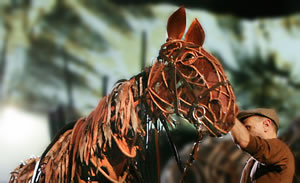58th (London) Division Memorial, Chipilly
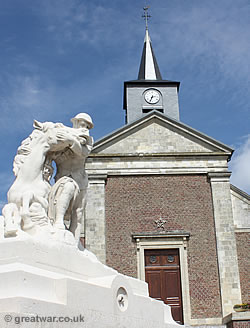
|
The memorial at Chipilly is dedicated to those who died while fighting with the 58th (London) Division including during the Battle of Amiens in August 1918.
The monument depicts an artilleryman cradling the head of his wounded horse. This divisional memorial is unusual because it includes the figure of an animal, most specifically a war horse. The inclusion of the horse pays tribute to the millions of horses who served alongside the military in the 1914-1918 war. Many thousands died while in service with military forces on all sides.
The Sculptor Henri Gauquié
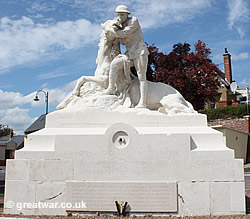
|
The memorial statue at Chipilly was created by the French sculptor Henri Désiré Gauquié (1858-1927). Gauquié was born in the ancient French village of Flers-les-Lille east of Lille in the Département du Nord. During the First World War this village of Flers was occupied by the German Army. The villages in this area were liberated in October 1918 by the British Army in during the autumn battles of the Allied Advance to Victory. In recent times, in 1970, the village was merged with two other nearby villages. Flers lost its name completely in this merger and the area is now known by the name Villeneuve-d-Ascq.
Henri Gauquié is known for having created a number of small bronze statues and a large number of life-size monuments of people and animals in France. One of his famous horse sculptures is the equestrian statue of Maréchal de Villars in Denain, a town between Lille and Valenciennes. The statue commemorates the marshal's victory at the Battle of Denain on 24th July 1712.
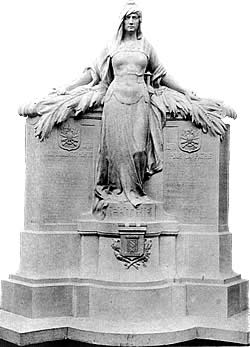
|
A well-known monument to the French Baroque painter Jean-Antoine Watteau was created by him in 1896 in the Jardin du Luxembourg in Paris as a collaboration in marble and bronze with the architect Henri Guillaume.
Another large monument by Gauquié was created shortly before the First World War, again as a collaboration with Henri Guillaume. This was a memorial constructed and dated as 1908. It was dedicated to the soldiers of the canton of Semur-en-Auxois in the province of Burgundy, eastern France. These French soldiers had died in defence of their country during the Franco-Prussian war of 1870.
Henri Gauquié died in Paris in 1927.
Location of the 58th Division Memorial
The memorial is situated in the centre of the quiet and pretty village of Chipilly on the crossroads next to the church on the D71a. Chipilly village is on the east bank of the River Somme.
Related Events
See our page giving information about two major events in London related to horses in the First World War:
War Horse
the highly acclaimed play by the National Theatre based on Michael Morpurgo's novel (extended run to February 2013).
War Horse: Fact and Fiction
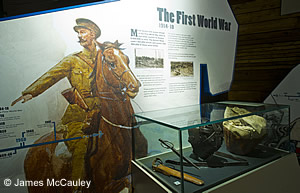
|
a major exhibition about the horse in war at the National Army Museum (to August 2012).
WW1 Exhibitions, Conferences, Lectures & Commemorative Events
Related Topics
Monuments on the Somme Battlefields
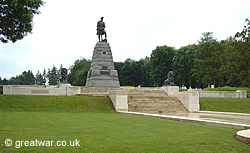
Monuments and Memorials on the Somme Battlefields
Further Reading

The War Horses: The Tragic Fate of a Million Horses Sacrificed in the First World War
by Simon Butler
The War Horses focuses on the horses, mules and donkeys that were requisitioned by the British Army to carry rations, pull guns and wagons full of munitions. The book is has received excellent reviews. It is illustrated with more than 200 photographs, includes eye witness accounts and reveals the great bond between the men and the animals they cared for in such difficult circumstances. Published by Halsgrove, 2nd edition (27 Sep 2011), ISBN-10: 0857040847 and ISBN-13: 978-0857040848

War Horse
by Michael Morpurgo
This book is about Joey, a farm horse requisitioned by the British Army for service in the First World War on the Western Front. The reader experiences the horrors of war and the compassion of the animals and humans in the story through the eyes of the horse. Written about 25 years ago as a result of Michael Morpurgo's conversations with First World War veterans, the story has taken on a new life as a highly acclaimed play and has been adapted into a major film by Steven Spielberg. Published by Egmont Books Ltd; Film tie-in ed edition (7 Nov 2011), ISBN-10: 1405259418 and ISBN-13: 978-1405259415

Warrior: The Amazing Story of a Real War Horse
by General Jack Seely
Warrior was a thoroughbred horse which went to France with Jack Seely in 1914. With Jack the horse survived on The Western Front for five years, both of them cheating death from bombs and bullets, and leading a cavalry charge by the Canadians in 1918. This republished edition is introduced by General Jack Seely's grandson, the well-known racing broadcaster and journalist Brough Scott. Published by Racing Post Books (10 Oct 2011). ISBN-10: 1908216107 and ISBN-13: 978-1908216106.
Acknowledgements
http://parissculptures.centerblog.net
Image of 1870 war memorial at Semur-en-Auxois from “Academy architecture”, 1904-1908. A collection of all the sculptures published in volumes 25-34 of “Academy Architecture”. Edited by Alex. Koch. Published 1908 in London.
Photograph of the War Horse: Fact and Fiction exhibition display by kind permission of the National Army Museum, London. Photo copyright James McCauley.

